What is an Intensive Care Paramedic (ICP)?
Intensive Care Paramedics are highly trained to perform advanced medical procedures beyond the scope of general paramedics. They are often the first on scene at life-threatening call-outs, providing complex care to patients before transporting them to hospital.
A highly challenging and intense role, those in the position must have completed several years as a registered paramedic and completed advanced specialist training to qualify to become an Intensive Care Paramedic. Depending on the jurisdiction you reside in, similar positions can be titled as Critical Care Paramedics, Mobile Intensive Care Paramedics etc.
Typical job duties of an ICP
An Intensive Care Paramedic will have spent several years as an on-road paramedic before transitioning into the role, so they will have plenty of experience in the regular duties of a paramedic. In addition to this, an Intensive Care Paramedic may be required to undertake:
- Advanced airway management, including endotracheal intubation.
- Complex management of patients with head injuries, including rapid sequence intubation
- Insert intra osseous (into bone) cannula for advanced drug and fluid administration in pediatric patients.
- Treat life threatening chest injuries including pneumothoraxes (collapsed lung) by inserting a chest tube.
- Advanced management of cardiac conditions.
- Insert a breathing tube (intubate) into their lungs.
Average ICP salary
ICP salaries greatly vary, based on location, education, skillsets and more. Despite this, qualified and experienced ICP’s can earn over $160,000.*
*Source: How to Become a Paramedic – Potential Salary
How to become an ICP
To become an ICP, you must first have served as an on-road Registered Paramedic for several years, often with a jurisdictional ambulance service. Once you have gained this experience, each individual will go on to complete specalist post-graduate training.
If you’re interested in taking the first step to a successful career as an ICP, consider APC’s HLT51020 – Diploma of Emergency Health Care. Not only does it place you on the best pathway to success for VET entry into university, it additionally offers the chance to gain employment in-field, confidence in your skills, time off your degree and even discounted university fees too!
To learn more about this pathway, click the button below.
How to become a ParamedicWhat its really like to be an ICP
Hear from Ricky, a Critical Care Paramedic for over 20 years and former QLD Paramedic of the year.
In his discussion with APC he talks about this exceptional role, including some career highlights such as a successful off-duty delivery of a neighbour’s twin breach birth, the role of a Peer Support Officer, a Paramedics kryptonite and much, much more!
ICP skillset and qualities
Excellent clinical skills
ICPs are some of the best of the best in paramedicine. This means they must maintain their skills to ensure safety at all times
Effective decision making
ICPs must think on their feet when dealing with medical emergencies, highlighting the essential nature of prompt and effective decision-making
Empathy & patient care
ICPs need to demonstrate compassion on a day-to-day basis to those who may be feeling vulnerable


